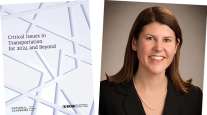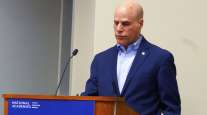Fuel-Tax Hikes, Tolls, Crowdfunding Are Interstate Payment Options

According to the sixth-annual survey conducted by San Jose State’s Asha Weinstein and Hilary Nixon, public support for a 10-cents-per-gallon fuel-tax hike rose from 31% to 48% when that increase was spread over five years. Large jumps in support also were recorded when respondents were told that the money would be designated for road maintenance (71%), safety improvements (64%), technology enhancements (59%), local air pollution mitigation (52%) and global warming mitigation (50%), figures that Weinstein called “quite encouraging.”
Weinstein and Nixon said that the support didn’t vary much across a slew of demographic subgroups and that it has risen modestly since 2010.
The interstate highway system is nearing the end of its designed lifespan and will cost $1 trillion to $2 trillion to replace, according to various estimates. Robert Poole of the Reason Foundation sees tolling as the solution.
Poole said that the Department of Transportation expects that trucking’s market share of freight movement will increase from 81.5% to 82.6% by 2040 and that trucks’ projected miles traveled will rise at twice the rate of passenger vehicles.
While Poole acknowledged that more than a few states raised fuel taxes in 2015, the five-year federal transportation bill that became law last month didn’t do so, and he doesn’t believe that support exists to devote such revenues to construction of major projects such as interstates. He also dismissed a diesel surtax, saying it’s unfair to non-freight diesel users and wouldn’t produce as much money as expected because of shifts to natural gas by trucking companies or to rail by firms seeking to move goods. That led him to tolling, which he said just gained the support of AAA.
“Trucking has legitimate concerns over the way that tolling was [done] in the 20th century, but trucks are already using 21st-century tolling [with PrePassPlus and BestPass transponders], which is pretty user-friendly at a very low cost,” Poole said.
Poole added that tolling revenue has to be solely designated to roads instead of to transit or other uses and that rates have to be predictable — based on time of day, not changing based on traffic congestion — for the trucking industry to relent its long-standing opposition.
Morteza Farajian’s solution is crowdfunding, which began as revenue streams for good causes and has worked for start-up companies. Crowdfunding rocketed from $16 billion in 2014 to more than $33 billion in 2015.
“Is there an opportunity to use it for infrastructure?” wondered Farajian, who has been involved with public-private partnerships through his work with Virginia’s Department of Transportation.
Farajian said P3s are a relatively new tool for delivering infrastructure projects.
He thinks it could be taken another step, by allowing individuals who are willing to take risks as developers to make investments by buying shares of projects. Farajian suggested that investors who live in a project’s geographic footprint could add to its buy-in and keep pressure on government officials to maintain their support even when administrations change.
For additional coverage of TRB, see the Jan. 18 edition of Transport Topics.




